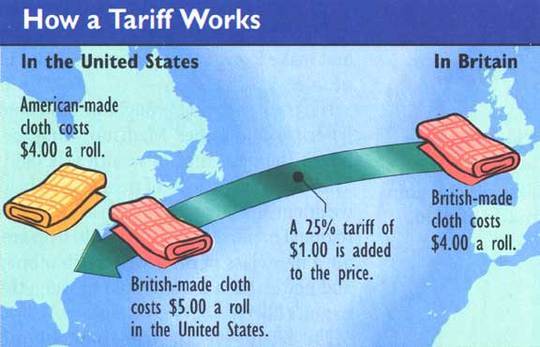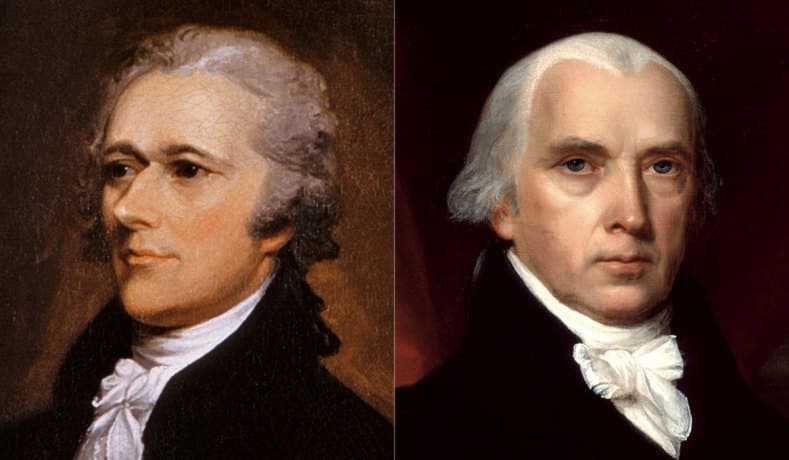The Tariff of 1789 was the first piece of legislation passed by President George Washington after his inauguration.
Its passage may have been controversial as many Americans were timid of the government gaining power it was necessary for various reasons.
Jump to:
- Fact 1: It Helped Raise Revenue for the Federal Government
- Fact 2: It Helped Protect Manufacturing Industries Developing in the Nation
- Fact 3: It Helped Sidestep the British Navigation Acts
- Fact 4: Helped the United States Retaliate against Foreign Governments
- Fact 5: It Caused Division in the Federalist Party
- Fact 6: It Divided the North and South
Fact 1: It Helped Raise Revenue for the Federal Government
The government needed the power to tax. Without the power to tax, it would not be able to afford to operate, raise an army, or create jobs. A federal tax would also unite the once separate 13 original colonies into the United States under one government and tax.
The inability to enforce a national tax was one of the failures of the Articles of Confederation.
Fact 2: It Helped Protect Manufacturing Industries Developing in the Nation
The American Revolution was followed by an economic reorganization, which carried in its wake a period of uncertainty and hard times.
During the conflict, labor, and investment had been diverted from agriculture and legitimate trade to manufacturing and privateers. Men had gone into occupations that ceased with the end of the war.
Lowered prices, resulting from the cessation of war demands, in combination with the importation of cheaper goods from Europe, were fast ruining such infant manufacturing concerns as had sprung up during the war, some of which were at a comparative disadvantage with the resumption of normal foreign trading relation.
The Tariff of 1789 would protect local industries from foreign trade by making their pricing more competitive.

Fact 3: It Helped Sidestep the British Navigation Acts
After the Revolutionary War ended, so did the advantages that colonial ships had at British ports.
Prior to the war, colonial merchants enjoyed the protection of British ships and free trade with other European powers. After the war ended, America was thrown into European politics, whether they wanted to be or not.
The British Navigation Acts made it more difficult for America to trade with British ports. Similar tactics were levied by the Spanish, French, and other European powers on the Americans.
However, American ports were not unified. Some tried to enforce a tax while others would not. Some tax would be cheaper than others. This resulted in foreign exports flooding into specific ports while others were left empty.
The federal government, under the Articles, tried to enforce a tariff but could not enforce it. The Constitution helped secure this loophole.
The Tariff of 1789 allowed the United States to retaliate on states that did not enforce a Tariff and the British Navigation Acts.
Fact 4: Helped the United States Retaliate against Foreign Governments
The United States in 1789 represented a significant population and market for foreign merchants. This represented a strong weapon that could be used to make European powers fall in line.
Often, hitting a nation in their economy is much stronger than having different skirmishes at sea. Throughout history, when merchants struggle, so does the nation and that nation's government.
Compliance with the Tariff of 1789 would force foreign powers to respect the American economy. If they tried to boycott, it would hurt their merchants, which would then hurt their own industry.
Fact 5: It Caused Division in the Federalist Party
James Madison was the author of the Federalist Papers and the main author of the Constitution. He was the primary government official pushing this piece of legislation that George Washington supported.
Alexander Hamilton, also a Federalist, did not support this piece of legislation as he saw it siding with Revolutionary France rather than England. Hamilton believed that it was important to improve relations with England as they had a stronger economy.
This would be the first disagreement of the two, which would eventually lead to James Madison leaving the Federalist Party and becoming a Democratic-Republican.

Fact 6: It Divided the North and South
The legislation produced the first sectional strains between North and South.
In the South, "agricultural interests" viewed the high tariff and tonnage rates as a triumph for northern merchants and manufacturers, the burden of which fell on southern staple crop exporters.
These divisions led to the formation of the First Party System.
